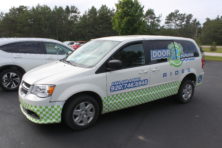State News: Foxconn, Dairy, Public Transit
- Share
- Tweet
- Pin
- Share
Dairy Organizations Ask For More USDA Aid
Dairy organizations in Wisconsin say the U.S. Department of Agriculture hasn’t done enough to help dairy farmers suffering from the effects of increased tariffs. The National Milk Producers Federation sent a letter to USDA Secretary Sonny Perdue this week, saying the agency’s new program to help farmers impacted by retaliatory tariffs, called the Market Facilitation Program, has done little to compensate for lost sales and lower milk prices.
The USDA announced last month it would pay dairy farmers 12 cents per hundredweight, or 100 pounds of milk, on half of this year’s production. The agency estimates that will equal about $127 million in direct payments to farmers.
But the National Milk Producers Federation points to a USDA estimate that increased tariffs have caused 2018 prices to drop 70 cents per hundredweight, a decline that will amount to more than $1 billion in lost income for dairy farmers this year.
“When you’re comparing what’s been done and what the impact has been, that’s why we’re continuing to work and tell the administration that we need to do something there, because dairy farmers are really being adversely affected,” said Jeff Lyon, general manager of the FarmFirst Dairy Cooperative, which is a NMPF member and based in Madison.
Report: Stagnant Public Transit Funding Limits Options
A new report on Wisconsin’s public transportation systems says inadequate funding has prevented many communities from expanding service.
Nine nonprofit organizations in the state reviewed U.S. Census data, local transit reports and interviewed riders for the two-year study.
Cassie Steiner, public relations associate for the Wisconsin John Muir Chapter of the Sierra Club and one of the authors of the report, said the project revealed gaps in most transit systems around the state.
“Public transportation systems are not necessarily connecting where people live or where there are low income areas, which experience lower rates of car ownership, to where opportunities were,” Steiner said.
She said the state should re-prioritize the current transportation budget to allocate more funding to public transit.
Minnesota Regulators Approve Natural Gas Plant Proposal
Minnesota and Wisconsin are one step closer to having a new natural gas plant as part of their energy future. The Minnesota Public Utilities Commission voted 3-2 Monday to approve a proposal for a natural gas plant that would be built in Superior, Wis., despite objections from clean energy and ratepayer groups, as well as some large industrial customers that would receive power from the new facility.
The Nemadji Trail Energy Center would be a joint venture between Minnesota Power and the Dairyland Power Cooperative in Wisconsin.
If Wisconsin regulators approve the plan, the new power plant would produce at least 525 megawatts of electricity. Minnesota Power and its ratepayers would be on the hook for half the $700 million cost.
Minnesota PUC regulators heard final arguments in the case earlier this month. Commissioners also decided Monday that the plan did not need to undergo additional environmental analysis, a decision that paved the way for its approval vote.
“It’s highly unlikely that Minnesota Power is going to have a gas generation option at a lower cost than this one,” argued Commissioner Dan Lipschultz, who voted in favor of the natural gas plant.
Wisconsin regulators still need to approve the proposed power plant and complete and environmental review. Minnesota Power hopes to have the plant online by 2025.
Foxconn Air Permits Resurface in Gubernatorial Race
The Wisconsin Department of Natural Resources may take another look at air quality permits for a Foxconn manufacturing plant if Democrat Tony Evers is elected governor. The state superintendent of schools told the Wisconsin State Journal the permits should be revisited.
David Petering, a chemistry professor at the University of Wisconsin-Milwaukee, said because the state did not require an environmental impact statement for the project, it is not clear how released toxins might interact with each other.
“They’re all treated independently of one another. But that’s not really what anybody is exposed to. They’re breathing all of this stuff in,” Petering said, adding, “It’s the environmental impact statement where you can actually have that sort of discussion.”
But Gov. Scott Walker says the project was fully vetted by the DNR.
“They apply the same laws and rules to Foxconn as they do to any other business,” Walker said at a campaign event Thursday in Eau Claire.
Walker said a speedy permit process is proactive and it is what businesses want.
In May, 2018, Illinois’ attorney general filed a suit against the U.S. Environmental Protection Agency for rules that exempted Foxconn from national pollution standards.
Wisconsin Public Radio, © Copyright 2018, Board of Regents of the University of Wisconsin System and Wisconsin Educational Communications Board.

